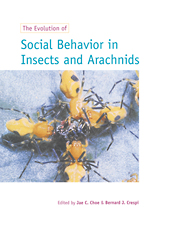Book contents
- Frontmatter
- Contents
- Contributors
- Acknowledgements
- Introduction
- 1 Are behavioral classifications blinders to studying natural variation?
- 2 Life beneath silk walls: a review of the primitively social Embiidina
- 3 Postovulation parental investment and parental care in cockroaches
- 4 The spectrum of eusociality in termites
- 5 Maternal care in the Hemiptera: ancestry, alternatives, and current adaptive value
- 6 Evolution of paternal care in the giant water bugs (Heteroptera: Belostomatidae)
- 7 The evolution of sociality in aphids: a clone's-eye view
- 8 Ecology and evolution of social behavior among Australian gall thrips and their allies
- 9 Interactions among males, females and offspring in bark and ambrosia beetles: the significance of living in tunnels for the evolution of social behavior
- 10 Biparental care and social evolution in burying beetles: lessons from the larder
- 11 Subsocial behavior in Scarabaeinae beetles
- 12 The evolution of social behavior in Passalidae (Coleoptera)
- 13 The evolution of social behavior in the augochlorine sweat bees (Hymenoptera: Halictidae) based on a phylogenetic analysis of the genera
- 14 Demography and sociality in halictine bees (Hymenoptera: Halictidae)
- 15 Behavioral environments of sweat bees (Halictinae) in relation to variability in social organization
- 16 Intrinsic and extrinsic factors associated with social evolution in allodapine bees
- 17 Cooperative breeding in wasps and vertebrates: the role of ecological constraints
- 18 Morphologically ‘primitive’ ants: comparative review of social characters, and the importance of queen–worker dimorphism
- 19 Social conflict and cooperation among founding queens in ants (Hymenoptera: Formicidae)
- 20 Social evolution in the Lepidoptera: ecological context and communication in larval societies
- 21 Sociality and kin selection in Acari
- 22 Colonial web-building spiders: balancing the costs and benefits of group-living
- 23 Causes and consequences of cooperation and permanent-sociality in spiders
- 24 Explanation and evolution of social systems
- Organism index
- Subject index
14 - Demography and sociality in halictine bees (Hymenoptera: Halictidae)
Published online by Cambridge University Press: 06 July 2010
- Frontmatter
- Contents
- Contributors
- Acknowledgements
- Introduction
- 1 Are behavioral classifications blinders to studying natural variation?
- 2 Life beneath silk walls: a review of the primitively social Embiidina
- 3 Postovulation parental investment and parental care in cockroaches
- 4 The spectrum of eusociality in termites
- 5 Maternal care in the Hemiptera: ancestry, alternatives, and current adaptive value
- 6 Evolution of paternal care in the giant water bugs (Heteroptera: Belostomatidae)
- 7 The evolution of sociality in aphids: a clone's-eye view
- 8 Ecology and evolution of social behavior among Australian gall thrips and their allies
- 9 Interactions among males, females and offspring in bark and ambrosia beetles: the significance of living in tunnels for the evolution of social behavior
- 10 Biparental care and social evolution in burying beetles: lessons from the larder
- 11 Subsocial behavior in Scarabaeinae beetles
- 12 The evolution of social behavior in Passalidae (Coleoptera)
- 13 The evolution of social behavior in the augochlorine sweat bees (Hymenoptera: Halictidae) based on a phylogenetic analysis of the genera
- 14 Demography and sociality in halictine bees (Hymenoptera: Halictidae)
- 15 Behavioral environments of sweat bees (Halictinae) in relation to variability in social organization
- 16 Intrinsic and extrinsic factors associated with social evolution in allodapine bees
- 17 Cooperative breeding in wasps and vertebrates: the role of ecological constraints
- 18 Morphologically ‘primitive’ ants: comparative review of social characters, and the importance of queen–worker dimorphism
- 19 Social conflict and cooperation among founding queens in ants (Hymenoptera: Formicidae)
- 20 Social evolution in the Lepidoptera: ecological context and communication in larval societies
- 21 Sociality and kin selection in Acari
- 22 Colonial web-building spiders: balancing the costs and benefits of group-living
- 23 Causes and consequences of cooperation and permanent-sociality in spiders
- 24 Explanation and evolution of social systems
- Organism index
- Subject index
Summary
ABSTRACT
I propose two hypotheses regarding the relationships between halictine bee demography and social behavior and the environment: the ‘Mating Limitation Hypothesis’ (MLH), that a female's social role (‘caste’) is dependent on whether she mates while young (and thus dependent on male demography); and the ‘Environmental Control Hypothesis’ (ECH), that the decision to lay eggs of one sex or another (thus defining male demography) is dependent upon the temperature and/or photoperiodic conditions experienced at the time the egg is laid, in temperate species. Published demographic and behavioral data typically lack the precision needed for truly conclusive analysis and review, and there are some important recently discovered phenomena that were historically overlooked, and extremely difficult to document. Nonetheless, a review of the available data reveals many notable features that can help evaluate the proposed hypotheses, and offers some guidance for future research. An older hypothesis that is also addressed here is that sexual selection is expected to promote protandry, for many reasons, yet the data on halictine bees suggests that protandry is absent in social populations, although it is characteristic of solitary populations.
Geographic variation in demography and behavior is common, and this variation appears to correlate with the seasonality of the habitat, in a manner consistent with the predictions of the two proposed hypotheses.
- Type
- Chapter
- Information
- The Evolution of Social Behaviour in Insects and Arachnids , pp. 293 - 315Publisher: Cambridge University PressPrint publication year: 1997
- 30
- Cited by



